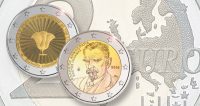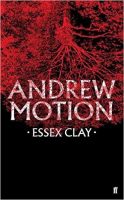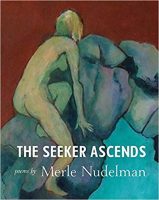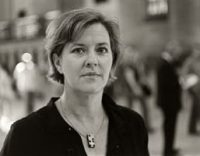June 14, 2018
Edited by David Sanders
Specimen Days
1479—Giglio Gregorio Giraldi, Italian poet (d. 1552), is born.
1883—Edward FitzGerald, English poet (b. 1809), dies.
1907—René Char, French poet/painter, is born.
1936—G. K. Chesterton [Gilbert Keith], English writer/poet (Father Brown), dies at 62.
1968—Salvatore Quasimodo, Italian poet/essayist (Nobel 1959), dies at 66.
2000—Attilio Bertolucci, Italian poet and writer (b. 1911), dies.

You have been my love for so many years,
It makes me dizzy to think of so much hope,
And my dizziness won’t be aged, or cooled;
Even by what waited for our death,
Or slowly learned how to fight us,
Even by what is foreign to us,
Or by my eclipses and my returns.
—from “To. . .” by René Char, translated by Susanne Dubroff
You have been my love for so many years, / It makes me dizzy to think of so much hope,” – René Char
World Poetry
A Poem to Remember: Prince William Praises Five Finalists of War Poetry Competition
The five finalists for a national poetry competition marking the 100th anniversary of the end of the First World War have been announced. The winner of ‘A Poem to Remember’, launched by Prince William back in February, will have their work read aloud by The Duke of Cambridge at the opening of the Defence and National Rehabilitation Centre (DNRC) later this summer. The poem will also be installed permanently at the facility.
Ecuadorian Politician and Poet Becomes Fourth Woman to Preside over UN General Assembly

The United Nations General Assembly on Tuesday elected Ecuadorean Foreign Minister María Fernanda Espinosa Garcés, President of its upcoming 73rd session; only the fourth woman to hold that position in the history of the world body, and the first since 2006. Ms. Espinosa secured 128 votes against 62 votes obtained by the only other candidate, UN Ambassador Mary Elizabeth Flores Flake of Honduras. In her acceptance speech, Ms. Espinosa also noted that she was the first woman ever from Latin America and the Caribbean to preside over the Assembly. She said she would maintain an open-door policy during her presidency and “act as an impartial, objective and open facilitator.” “As you know, I am also a poet as well as a politician. As such, I am fully aware that no view is useful if we do not see, and no word has value, if we do not listen. I will be ready to listen to you all and work for, and with you,” she said.
Armed with Poetry and Rap, South Sudan's Young Artists Battle for Peace
A group of artists and musicians in South Sudan is on a mission – to mobilize young people across the country through music, graffiti and poetry to help bring peace to the war-torn nation. In 2011, the streets of the capital Juba were full of revelers, celebrating the world’s newest nation. But hope for the future has soured after more than four years of civil war, with about a third of the country’s 12 million people forced from their homes by conflict. Arts movement AnaTaban, or “I am tired” in Arabic, is trying to address anger over failed promises and suppression of independent voices by advocating for peace and unity among young people through media they like – rap music, slam poetry, and YouTube videos.
Poet Eavan Boland Elected to the Royal Irish Academy

The Royal Irish Academy elected English professor and acclaimed poet Eavan Boland as an honorary member. Boland, the Bella Mabury and Eloise Mabury Knapp Professor in Humanities and director of the Creative Writing Program, was among 28 new members admitted for “their exceptional contribution to the sciences, humanities and social sciences as well as to public service,” according to an announcement from the academy.
The Royal Irish Academy elected English professor and acclaimed poet Eavan Boland as an honorary member.
Recent Reviews
What Tracy K. Smith Sees in America
In her latest collection, Wade in the Water, the U.S. poet laureate takes a loving and unflinching look at a country’s present and past.
by Adrianna Smith
“Our country is like a really old house,” the historian and journalist Isabel Wilkerson said in an interview barely a week after the 2016 election. “Old houses need a lot of work. And the work is never done … Whatever you’re ignoring will be there to be reckoned with until you reckon with it. And I think that that’s what we’re called upon to do where we are right now.” Tracy K. Smith, in her current role as U.S. poet laureate and in her fourth collection of poetry, Wade in the Water, is rolling up her sleeves and excavating the basement of this old house.
Poetry and Prose by Martina Evans, Ailbhe Darcy and Paula Meehan
‘Now We Can Talk Openly About Men’, ‘Insistence’, and Ireland Chair lectures
by John McAuliffe
Martina Evans’s new book, Now We Can Talk Openly About Men (Carcanet, £9.99) intervenes strikingly in the literature of Irish history during and after the War of Independence. Like Feargal Keane’s Wounds,and Cork University Press’s Atlas of the Irish Revolution, Evans is drawn to gaps and silences in the historical record. Her book dreams up two dramatic monologues for women whose lives were altered by an actual event in Mallow in 1920 (also the subject of an excellent earlier poem, Mallow Burns). Kitty Donavan is a widowed dressmaker working in Mallow, while Babe Cronin is a stenographer working at Dublin Castle. What binds their stories together is Eileen Murphy, a member of Cumann na mBan, who is tortured in Mallow, and run out of town, ending up living in a hotel in Dublin. The women’s professions mean they must negotiate between the different sides at war, and are torn between making business as well as personal and political decisions.
Martina Evans’s new book intervenes strikingly in the literature of Irish history during and after the War of Independence.
Broadsides
Poetic Orthodoxy
by Peter J. Leithart
I’m obviously not orthodox,” said the Welsh poet and priest R.S. Thomas, who died in 2000. He wasn’t kidding. In his autobiography, Neb, he wrote that the apostles “believed that the risen Christ had appeared to them” and “sought to transmit their vision to future ages through the medium of words.” This sort of liberalism seems to be what Thomas had in mind when he said, “the Resurrection is a metaphor.” (Then to hell with it, Flannery O’Connor retorts.) “I don’t know how many real poets have ever been orthodox,” he told an interviewer. For Thomas, poetry occupies a zone beyond orthodoxy: “Any form of orthodoxy is just not part of a poet’s province. … A poet must be able to claim … freedom to follow the vision of poetry.”
“I’m obviously not orthodox,” said the Welsh poet and priest R.S. Thomas, who died in 2000. He wasn’t kidding.
Drafts & Fragments
Bryn Mawr Alum Wins Prestigious Frost Farm Poetry Prize

“Buddy had loved me long, but from afar.”
That’s a pretty good first line. It makes you want to read on, to see what happens, if anything, between Buddy and the “me” who’s speaking. And it’s in iambic pentameter. More on that in a minute. It’s the first line of “Buddy” by accomplished poet and 1984 Bryn Mawr grad Susan de Sola. “Buddy” has been awarded first prize for metrical poetry in the eighth annual Frost Farm poetry contest, out of 1,123 total submissions.
Greece Honors Dodecanese, Poet Kostis Palamas With New Coins

Greece is issuing commemorative €2 coins honoring the 70th anniversary of the Dodecanese islands’ return to Greece and the 75th anniversary of the death of poet Kostis Palamas. The Dodecanese is a group of 15 large islands — including Rhodes and Kos — and 93 small islands and islets in the Southeastern Aegean. They were formally united with Greece by the 1947 Peace Treaty with Italy after World War II. . . . The second €2 coin celebrates poet Kostis Palamas (1859-1943), 75 years after his death. It has a portrait of the artist with his name and the country’s name.
Greece is issuing commemorative €2 coins honoring the 75th anniversary of the death of poet Kostis Palamas.
Poetry In the News
3 Boston Review Poetry Editors Resign Over the Magazine’s Handling of Junot Díaz
The three poetry editors at the Boston Review, Timothy Donnelly, B.K. Fischer, and Stefania Heim, have stepped down after the magazine decided to retain Junot Díaz, who was recently accused of sexual misconduct and verbal abuse.
At 99, the Poet Lawrence Ferlinghetti Has a New Novel

A few years ago, the literary agent Sterling Lord got a surprising phone call from his oldest client, the poet Lawrence Ferlinghetti. Mr. Ferlinghetti, who turned 99 this spring, had a new manuscript to show him, a novel. Mr. Lord, who is 97, was immediately taken with the book. “I think he’s done something quite unusual,” he said. The novel, titled “Little Boy,” fuses elements of autobiography, literary criticism, poetry and philosophy, in a headlong, often stream-of-consciousness style.
Taking Note: Poetry Reading Is Up—Federal Survey Results
Nearly 12 percent (11.7 percent) of adults read poetry in the last year, according to new data from the National Endowment for the Arts’ 2017 Survey of Public Participation in the Arts (SPPA). That’s 28 million adults. As a share of the total U.S. adult population, this poetry readership is the highest on record over a 15-year period of conducting the SPPA, a research partnership with the U.S. Census Bureau.
Billy-Ray Belcourt, Susan Howe Win 2018 Griffin Poetry Prize

The lavish Griffin Poetry Prize gala at the Distillery District’s Fermenting Cellar had plenty of competition last night (Thursday, June 7) and not just among the finalists. Between the Ontario election and the possibility that the Washington Capitals might win their first Stanley Cup, gala-goers were having trouble focusing and could be seen scrolling through their phones during the presentation. The award – Canada's biggest poetry prize, honouring one Canadian and one international poet with $65,000 each – eventually went to two deserving names, but the gala got off to a rocky start. After Hamish Marissen-Clark, a 2018 national winner of Poetry In Voice/Les Voix De La Poésie, gave an excellent reading of Wayde Compton’s Illegalese: Floodgate Dub, the lifetime recognition award winner Ana Blandiana took the stage with her translator Viorica Patea to present some of her work.
The poet Lawrence Ferlinghetti, who turned 99 this spring, has a new novel.
New Books
Essex Clay by Sir Andrew Motion
[Hardcover] Faber & Faber, 112 pp., $13.04

Andrew Motion's prose memoir In the Blood (2006) was widely acclaimed, praised as 'an act of magical retrieval' (Daily Telegraph) and 'a hymn to familial love' (Independent). Now, twelve years later and three years after moving to live and work in the United States, Motion looks back once more to recreate a stunning biographical sequel – but this time in verse. Essex Clay rekindles, expands and gives a tragic resonance to subjects that have haunted the poet throughout his writing life. In the first part, he tells the story of his mother's riding accident, long unconsciousness and slow death; in the second, he remembers the end of his father's life; and in the third, he describes an encounter that deepens the poem's tangled themes of loss and memory and retrieval. Although the prevailing mood of the poem has a Tennysonian sweep and melancholy, its wealth of physical details and its narrative momentum make it as compelling as a fast-paced novel: a settling of accounts which admits that final resolutions are impossible.
WhenThen by Gerd Stern
[Paperback] Dos Madres Press, 92 pp., $17.00
"Whenever I look for the avant-garde in literature and the arts, I often lament, thinking that I must forge one for myself. Then I regard Gerd Stern sternly and know that he was/is the last of the red hot Dadas of the avant-garde, back when/then he delighted us with his poetry and artistic enterprise and continues to delight us in his WhenThen, this delightful collection of poems, which prove his mastery and mystery. Got 'em. Anyone who thinks he/she/it knows poetry should get this book and mind-bend all over again."–John J. Trause
The Seeker Ascends by Merle Nudelman
[Paperback] Inanna Publications, 100 pp., $18.95

The poems in this book trace the emotional and spiritual journey of a woman whose beloved son dies after an arduous battle with cancer. Nudelman explores the nexus between art, healing, and truth. As the woman gradually climbs out of grief's darkness she reclaims her own life's purpose. Confronting her losses, she heals. This collection is about strength, survival, love, and the healing that comes from self-empowerment through speaking one's own truth and releasing the past. Inspired by art and nature, the poet/mother reconnects with her own fortitude and the possibilities that still exist.
She Lives There Still by Mary Leader
[Paperback] Shearsman Books, 70 pp., $17.00
She Lives There Still is Mary Leader's second collection with Shearsman Books. In some senses, it is an extension of her previous Shearsman volume, Beyond the Fire, in that it reinforces what John Muckle in PN Review described as, "The overall impression is of a mind that's acute, musical and subtle being brought to bear on everyday life." In other senses, it seeks radically to complicate any concept of the everyday to account for wisdom, but be warned, it is a peculiar wisdom. The "she" of the title is from a Mother Goose rhyme, but two key series ("A Warty Chin" and "A Withy Hut") and between them a key sequence ("Cornucopia of Arcadia") could also be called "Crone Cards." An initiating question asks: "And, well, should she rule for mythology / versus history? What material / difference is there?" And, well, seventy pages later, questions are still being asked: "Who are we, so / physically new?" Throughout, the reader will encounter Leader's characteristic passions for form and for variety. But the book also affords a tightly organized demonstration of what The New Yorker called Leader's "quite remarkable sensibility, which is one of the most self-possessed in contemporary poetry."
What I Got for a Dollar by Bert Stern
[Paperback] Grid Books, 96 pp., $16.00

In this exquisite third book, Bert Stern grapples with the elemental and the extraordinary, looking back on the length of his journey and finding realms of possibility, powerful proof of a life well lived. Moments of divine recognition pervade these poems–their rough terrains, their changing atmospheres and stunning grace–culminating in a profound sense of gratitude for the tactile world. Here is a poet writing at the height of his powers.
In this exquisite third book, What I Got for a Dollar, Bert Stern grapples with the elemental and the extraordinary.
Correspondences
Colorado Poet Series: Interview with Elizabeth Robinson
by Bianca Glinskas

As a part of the Local Emerging/Established Poet Interview Series, I am excited to introduce Elizabeth Robinson, a local established poet! For those of you who aren’t familiar with her name or work, here is Elizabeth Robinson’s poet biography: Elizabeth Robinson is the author of multiple collections of poetry, including the National Poetry Series winner, Pure Descent, and the Fence Modern Poets Prize winner, Apprehend. Her poetry has appeared in such anthologies as American Hybrid, The Norton Anthology of Postmodern American Poetry, and The Best American Poetry of 2002. She works as the homeless navigator for Boulder Municipal Court and teaches at Lighthouse Writers’ Workshop.”
Back Draft: Victoria Chang
The poet on her revision process and coping with grief.
by Ben Purkert
Victoria Chang’s poetry finds vitality in the past while re-imagining what’s ahead of us. Her current manuscript-in-progress, recently honored with the Alice Fay Di Castagnola Award from the Poetry Society of America, features a series of obituary-style poems. I was curious to know: how does she revise these? Isn’t an obit defined by its finality? Our conversation touched on mortality, generational difference, and how the loss of a parent can transform a writer’s whole worldview. She also admitted that her own kids don’t care about poetry—and that she thinks that’s a great thing.
Elizabeth Robinson recently took part in the Colorado Poet Series.
Envoi: Editor’s Notes
Lessons from the Past: René Char
“In the poet two kinds of evidence are held: the first yields its whole meaning at once in the variety of forms available in external reality, it rarely goes deep, it is only pertinent; the second is inserted into the poem, it speaks the commandment and exegesis of the powerful and capricious gods who inhabit the poet, it is the indurate evidence that can neither fade nor die. Its hegemony is its attribute. Spoken, it covers a considerable expanse.”
―from "The Formal Share," translated by Jackson Matthews
“The poem, it speaks the commandment and exegesis of the powerful and capricious gods who inhabit the poet.” – René Char